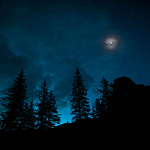When I was training to be a counselor, I had internships where I worked with clients under supervision. This was a nerve-wracking experience. I had to take everything I’d learned and try to make someone’s life better – or, at the very least, not make it worse.
Before I started my first internship, my therapist encouraged me to “find God” in every client. What she meant was instead of only focusing on skills assessments and asking open-ended questions, I needed to see the human being in front of me, with all their frailties and strengths. To see how each was a divine creation.
That simple piece of advice changed me. Not merely how I counseled, but how I walk through the world.
Every person you pass carries the breath of the Divine. We are each born bearing the imprint of something holy.
But it seems like many of us are forgetting that, or maybe never saw that to begin with. When we stop thinking of others as equally worthy as we are, our humanity disintegrates. Cruelty finds a foothold, both in individuals and collectively in society.
Our social structures can – and do – normalize detachment. We create more and more distance between “the other” and us.
Cruelty rarely begins with hatred; it often begins with distance. Bureaucratic language that calls civilians on the opposing side in a war “collateral damage,” thereby numbing our moral response. Social groups that we lump together into a “them,” rather than seeing individual people and their humanity. A social media landscape that allows anonymity and rewards humiliating others with likes and shares.
Cruelty rarely begins with violence. It begins with stories – told again and again – about who is worthy and who is not. And eventually, those stories shape what we see … and freeze our empathy for each other into a cold, unfeeling landscape.
Cruelty rarely begins with big pronouncements. It begins with subtle distinctions that reinforce differences. Phrases like “the deserving poor” implies that some – or most- poor people are undeserving. And when someone is struggling, seeing someone deemed “unworthy” getting help fuels anger and resentment.
When grief and pain, anger and resentment have nowhere to go, the ground is ripe for collective cruelty to emerge.
And here we are, in a time when disconnection too often becomes cruelty … and cruelty, when left unchecked, becomes performance. We see it in biting comments, online mockery, and policies that punish rather than protect. We see it in the way collective pain becomes fuel; how outrage draws a crowd, and suffering becomes a show.
Cruelty no longer hides in the shadows. It gathers applause.
Cruelty can be a tool – a tool for asserting control, a tool for accumulating power, a tool for revenge, not just today, but throughout history.
In 1994 in Rwanda, across the radio airwaves, extremists from the majority ethnic group, the Hutus, were calling the Tutsis, the minority ethnic group, “cockroaches” -- a vile insect that you step on or exterminate. This language was repeated over and over again on the radio, in the press, and overwrote the empathy that once lived between the groups. The Tutsis weren’t neighbors anymore, they were pests. When the killing started, neighbor turned against neighbor with ruthless efficiency in death and destruction.
The killing didn’t begin with the machete. It began with the metaphor of “cockroach.”
This is chilling to hear, I know. People forgot that those they called “cockroaches” were, in fact, sacred creatures, with the Divine within them. When we forget the sacred in each other, we also begin losing our own sacred connection.
In the early 1990s, the world watched as Serbs and Croats turned against each other – neighbors, classmates, coworkers. Ancient grievances were resurrected, and with them, new myths: who belonged, who was a threat, and who had to go. People who once played soccer together, served on town councils together, turned on each other almost overnight. In a matter of weeks, entire towns unraveled.
I don’t share this to horrify, but to ask: How do we stop this before it begins? How do we remember each other – truly remember – before the separation gets too great, before empathy becomes frozen and forgotten?
Once you label someone as ‘the enemy,’ the sacred becomes invisible. But it’s still there under the surface, waiting for us to see, still shining muted under the mud and slime of words and collective amnesia.
We’ve seen this kind of forgetting here, too – ritualized, normalized, even celebrated. In the early 20th century, lynchings in the U.S were sometimes public events. Families brought boxed lunches. Children played. The body of a Black man – someone’s son, someone’s friend – became a backdrop for celebration. And a photographed postcard to send to relatives.
This is what can happen when we forget the sacred in each other. Cruelty can become casual, disconnection can grow, and this learned cruelty can become communal. And make no mistake about this … cruelty is indeed learned until an entire society forgets the divine nature in each soul.
And today … how are we being taught, being trained to look away? What cruelty are we absorbing, so often that it feels commonplace? What jokes, headlines, or habits are steadily guiding us to unsee the soul in someone else?
Notice.
Notice when a single crime is used to condemn an entire group.
Notice when people are compared to animals or insects – rats, vermin, cockroaches.
Notice when pain is turned into blame instead of healing.
And especially notice who benefits from the story being told.
Even in the darkest moments, the sacred hasn’t disappeared. It is hiding underneath the surface waiting for us to remember.
Love is always waiting. Compassion can be rebuilt. When we choose to look again, to really see, the sacred returns. Wipe off the mud and slime from our eyes and our hearts, and the brilliant soul of each person is again visible.
Twenty years ago, I was asked to find God in every client I saw. Finding the sacred in each other begins one person, one step, one intention at a time.
When you see through the eyes of love, the beauty of humanity is breathtaking.
Joni Miller, Ph.D., is a writer, researcher, spiritual coach, and speaker who uses her knowledge, education, and love of all things spiritual to help spiritual wanderers find a place they can call home, navigating by the light of Love.
https://www.britannica.com/event/Rwanda-genocide-of-1994
https://www.history.com/articles/bosnian-genocide
https://naacp.org/find-resources/history-explained/history-lynching-america













Share this post